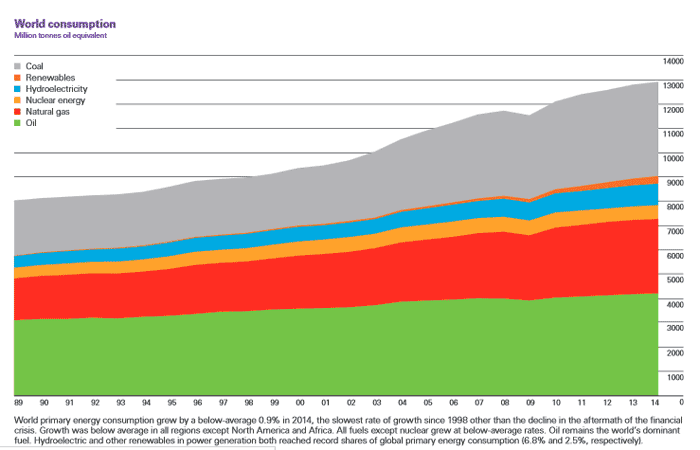As usual in June, BP last week released its annual Statistical Review of World for Energy 2015.The review is a sort of almanac of all matter of energy related data, now in its 64th year, and as always it is quite an interesting read.
The headline news is that for the first time, the US in 2014 the US was the number 1 producer of oil and natural gas combined, as the fracking revolution continues on. The US also supplanted Saudi Arabia as the world's largest producer of just oil as well, a prospect that the report says was "unthinkable 10 years ago."
The US increased its move oil production by an impressive 1.6 million barrels per day, the third consecutive year that the level of growth in the metric was 1 million of more barrels per day - the first time that has ever happened for any country, BP says.
Surging US production had the major impact on dramatically falling energy prices in the last half of 2014 the report says. And somewhat astoundingly, the US produced 90% of the energy that it consumer in 2014, up substantially from just a few years ago.
Global primary energy consumption increased by just 0.9% in 2014, down from 2% in 2014 and its slowest rate of growth since the late 1990s, other than immediately after the financial crisis in 2009. This slowing was driven in part by the rebalancing of the Chinese economy away from energy intensive sectors, causing the growth of energy consumption in China to slow to its lowest rate since 1998.
It's worth noting that the International Monetary Fund says global GDP growth in 2014 was 3.4%, well above the 0.9% increase in energy consumption.
All this slowdown in the growth of energy consumption appears to come about equally from a lackluster global economy last year and better energy efficiency.
Emerging economies accounted for all the net growth in energy consumption, the 2.4% growth in those countries last year was well below its 10-year average of 4.2%. Energy consumption on developed economies actually decreased by 0.9%, but increased 1.2%, as the economy here was in general much stronger than say in Europe.
Oil remained the world's leading fuel, with 32.6% of global energy consumption, but lost market share for the fifteenth consecutive year. While the rate of coal-produced energy growth slowed last year, it was still positive, at 0.4%. However, China's consumption of coal-powered energy was basically flat in 2014, after many years of rapid growth.
Global nuclear output grew by an above-average 1.8%, the second consecutive annual increase, and the first time nuclear power has gained global market share since 2009.
Renewables - solar, wind, biofuels, etc. - were again the fastest growing form of energy and, in a year when global consumption growth slowed sharply, they accounted for one-third of the increase in total primary energy use. However, renewables provided only around 3% of the world's energy needs in 2014 - but that is up from a 0.9% share one decade ago.
A chart showing global energy consumption by fuel source over time is shown below.

Source: BP
With the slowdown in overall energy consumption, BP estimates that calculations suggest that global CO2 emissions from energy use grew by just 0.5% in 2014, the weakest since 1998, other than again in the immediate aftermath of the financial crisis.
There's a lot more, and we encourage you to take a look at the report, which is available here: BP Statistical Review of World Energy 2015.
Good job by the experts at BP again this year
Any reaction to this year's BP report? Let us know your thoughts at the Feedback button below.

|